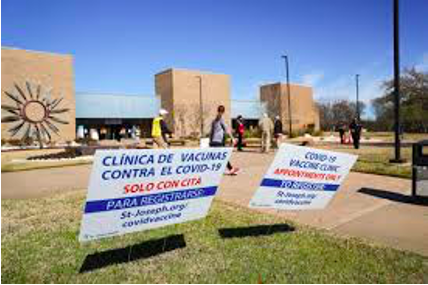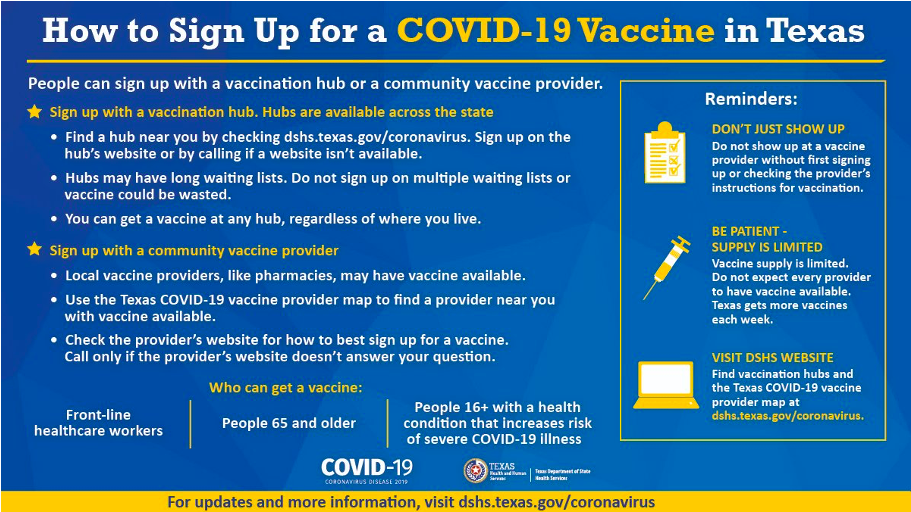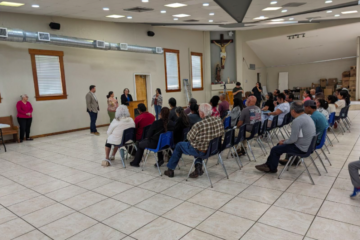Vaccination Education and Registration Campaign
The push to vaccinate people against the coronavirus has brought energy and hope to communities across the country and around the world. In the United States, who can get vaccinated, where and how, varies widely from state to state, but vaccination rates have steadily increased since December 2020. With the creation of “vaccination hubs” overseen by local authorities in Texas, the process of getting doses of approved vaccines into people’s arms has picked up momentum. In Brazos County, a weekly average of 5500 doses were administered since the beginning of February (except for the week of February 15, when the crippling winter storm reduced the week’s total to less than 200 doses). At this point, many of us know someone (or may even count ourselves as) among the fortunate people who have already been vaccinated.


Why do we observe these inequities? Advocates and analysts have pointed to many possible explanations, including:
- the digital divide (lack of access to internet and email, used by most providers to register and communicate with prospective vaccine recipients)
- language and literacy barriers (providers’ failures to staff registration units and facilities with bilingual employees or volunteers, as well as a reliance on written rather than oral/aural information)
- misinformation about the coronavirus vaccines (amplified by disinformation campaigns, social media, and informal communication networks)
- lack of trust in public/government/medical authorities (due to the history of discrimination, profiling or unfair treatment of people from communities of color)
- pragmatic concerns: difficulties in getting time off work, transportation to vaccination hubs, concerns about who can enter facilities, the documentation needed, etc.
Faced with these circumstances, BIIN and other local organizations have been working together to educate people in medically underserved communities about the vaccination push, and to make it easier for them to register for vaccination. Representatives from BIIN, Santa Teresa Catholic Church, Brazos Amigos, and the Hispanic Forum, as well as local elected officials (Justice of the Peace Celina Vasquez, Bryan councilman Reuben Martins) have met via Zoom and kept up a steady stream of emails and communications in the past month. On February 5, they met with AJ Renold, Executive Director of the Heart of Texas Chapter of the Red Cross, and part of the Brazos County Vaccine Task Force, to discuss their concerns with equity and the procedures adopted at the county vaccination hub located at the Brazos Center in Bryan. On February 23, a second meeting was held (originally scheduled for February 16, it was delayed due to the winter storm), to share updates on various efforts to educate and register community members for vaccination. Here’s an overview of what BIIN and affiliated organizations are currently doing:
- Sharing information about vaccines and vaccination registration with their clients.
- Recruiting and organizing Spanish-speaking volunteers to do socially distanced in-person registration for vaccination in low-income senior housing complexes and at other locations on weekends.
- Recruiting and training bilingual volunteers aged 18 and over to work at the 211 call center on Mondays through Fridays, where eligible community members can register by phone for the vaccination.
- Coordinating a public relations campaign to disseminate information about the vaccine in Spanish through local Spanish-language media outlets, social media, and on their own website.
- Making a series of short videos in Spanish featuring interviews with trusted local leaders, such as Catholic priests, Spanish-speaking health authorities, etc. These videos address topics such as how to avoid getting or transmitting the virus, the safety of coronavirus vaccines, and how to register for vaccination. They will soon be disseminated via social media and posted on the BIIN website.
- Recruiting bilingual volunteers to help with the vaccination registration drives and help coordinating volunteers. We are looking for a volunteer coordinator to spearhead this effort. If you are interested or know someone that may be interested, please contact Jaimi Washburn at info@brazosimmigration.com.




